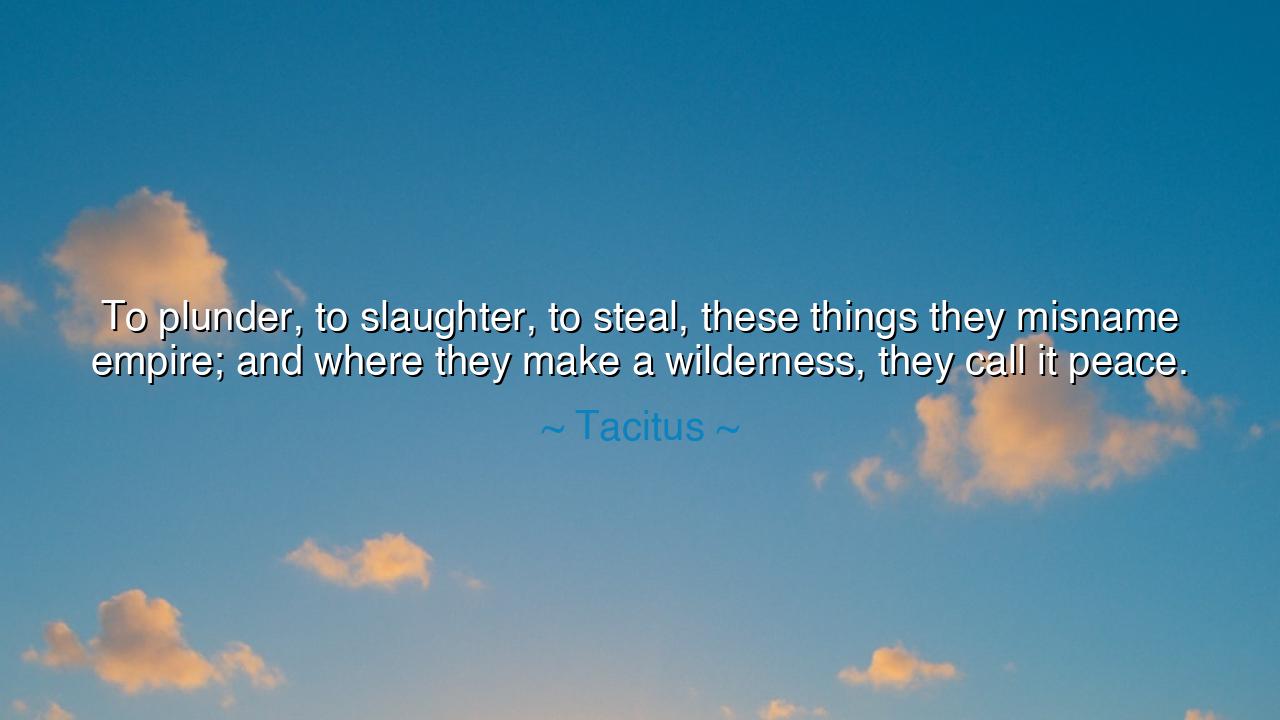
To plunder, to slaughter, to steal, these things they misname
To plunder, to slaughter, to steal, these things they misname empire; and where they make a wilderness, they call it peace.






“To plunder, to slaughter, to steal, these things they misname empire; and where they make a wilderness, they call it peace.” So thundered Tacitus, the Roman historian, who wrote not as a flatterer of power but as a prophet against its corruption. In this sentence lies the eternal indictment of conquest and tyranny: that men who devastate lands, shatter peoples, and drain nations of life dare to cloak their deeds with noble names—calling theft empire, calling desolation peace.
The ancients were no strangers to such hypocrisy. Rome itself, though it spoke endlessly of the Pax Romana, the Roman Peace, often secured that peace not by justice or harmony, but by the sword. Villages were burned, cultures crushed, treasures taken, and those who resisted were annihilated. What was left behind—a silence born of fear, a wilderness stripped of voice and life—was hailed by the conqueror as peace. Tacitus saw this with clear eyes and wrote with the courage of truth: the silence of the conquered is not peace, but despair.
History has echoed his words again and again. Consider the conquest of the New World. The empires of Spain and Portugal declared they had brought civilization, but behind them lay broken nations, enslaved peoples, and forests turned to wasteland. They claimed to spread the light of Christ, but too often spread fire and steel. Where once vibrant cultures thrived, only ashes remained—and the conquerors named their ruin order. Tacitus’ voice, though from Rome’s age, speaks directly to such moments: beware when destruction is dressed in the garments of righteousness.
The power of this quote is its unveiling of language as a weapon. Tyrants and conquerors rarely admit to their crimes; instead, they rename them. Plunder becomes tribute, slaughter becomes victory, slavery becomes protection. Words, bent and twisted, become shields to hide atrocity. Tacitus reminds us that the wise must look not at what rulers say, but at what they do. If they call it peace but it reeks of ruin, if they call it empire but it is built on chains, then one must speak plainly and name things as they are.
Yet Tacitus’ cry is not only condemnation; it is warning. For every generation faces the temptation to justify its own ambitions with fine words. Leaders claim necessity, destiny, or progress, but if they sow death and leave behind only wilderness, their peace is but illusion. True peace is not silence born of fear, but harmony born of justice. True empire is not domination, but stewardship—the lifting of peoples, not their erasure.
The lesson for us is clear: measure nations, leaders, and even your own deeds not by the names they bear but by the fruits they yield. Ask: does this act create life or destroy it? Does it build community or leave a wilderness behind? For history judges not by titles but by outcomes, and even the mightiest empire built on plunder and slaughter will fall into dust.
Practical wisdom follows: in your own life, speak plainly, live honestly, and do not disguise harm with fine words. Do not call selfishness ambition, or cruelty strength, or apathy peace. Build peace that nurtures, not peace that silences. Build success that uplifts, not success that robs others of dignity. For in every small act, the same choice lies before you that faced the empires of old: will you create a wilderness and call it peace, or will you create true harmony and call it life?
So let the words of Tacitus endure as a torch in the darkness: “To plunder, to slaughter, to steal, these things they misname empire; and where they make a wilderness, they call it peace.” O children of tomorrow, beware the lies of power, and do not be deceived by noble names for ignoble deeds. Seek the peace that gives life, not the silence of the grave. For only in truth, justice, and mercy can peace take root and endure.






TLNguyen The Lam
I find this quote thought-provoking, but also a bit discouraging. It’s tough to imagine how many conflicts throughout history have been justified with claims of bringing peace, when in reality, they only created suffering. Do you think this kind of manipulation still happens today? How can we hold those in power accountable for their actions when they disguise violence as something more acceptable?
KCSo Koo Chouu
This quote seems to criticize the hypocrisy of imperialism—how they frame violent actions as necessary for maintaining peace. But, could there be any circumstance where what they call 'empire' is actually creating some form of stability? I’m curious about what we can consider true peace, because sometimes it seems like peace is just the silence after a lot of destruction. How do we determine what’s really ‘peaceful’?
BTVo Thi Bao Thuy
Tacitus’ words are quite harsh, but they ring true. History is full of examples where conquering empires have claimed peace while causing mass suffering. It makes me wonder—why do empires, in any age, continue to use violence and oppression to create what they define as 'order'? Is the idea of peace often just a cover-up for a much darker reality?
KDKhanh Duy
This quote really makes me think about how history often paints violent conquests as noble acts of empire-building. It’s unsettling how the destruction of entire cultures or societies is justified under the guise of ‘bringing peace.’ Is this something we still see in modern geopolitics? How do we, as individuals, separate the narratives of peace from the true cost of that so-called peace?